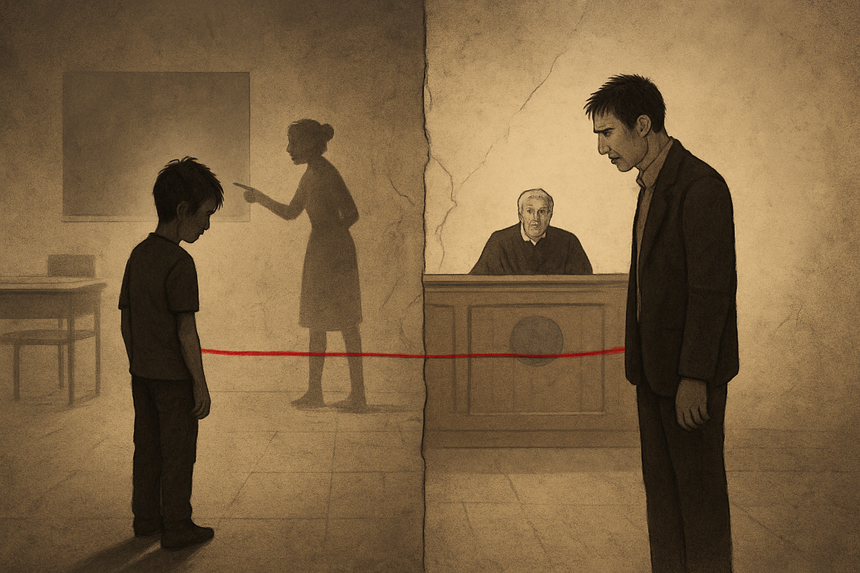Why Don’t We Parent Our Institutions the Way We Parent Our Children?
Before we talk about classrooms or courtrooms, sit with this question for a moment:
If nurturing, responsive, emotionally attuned parenting helps children grow into healthier, more resilient humans… why don’t our schools and justice systems use the same principles?
Research-backed programmes like The Incredible Years, grounded in attachment science and cognitive behavioural strategies, consistently show:
Reduced child behaviour problems
Improved emotional regulation
Stronger parent–child relationships
Better long-term outcomes
So why do the systems children grow up in, schools and later justice institutions, so often abandon the very practices proven to build healthy behaviour? Why do they lead with punishment instead of emotional understanding?
Why do we replace:
Safety with shame?
Guidance with control?
Repair with punishment?
And why, as adults, do we accept this as normal?
What happens to a society when its institutions ignore the developmental wisdom its parents are encouraged to use?
Think Back to the First Time You Were Punished
Not corrected, but punished.
Maybe you were sent out of the room.
Maybe you were shamed in front of the class.
Maybe you heard the words, “You should’ve known better.”
Do you remember what your body did?
The burning in the chest.
The tightening in the throat.
The knot in the stomach.
Did that moment teach responsibility?
Or did it quietly teach fear?
And if that early lesson became a belief, “When I get things wrong, I deserve to hurt”, what happens when a society builds entire justice systems on the same assumption?
What Early Lessons Did We Absorb Without Realising?
Long before anyone stands in a courtroom, they stand in a classroom. What did we learn, not through instruction, but through experience? Did we learn that:
“Follow the rules or pay the price”?
“Authority defines right and wrong”?
“Context doesn’t matter; compliance does”?
“Pain is corrective”?
“Those who misbehave need to be controlled”?
If children internalise these lessons… is it any surprise that the institutions they later build reflect the same logic?
If a society grows up fearing mistakes, distrusting vulnerability, and equating discipline with pain, how could its courts and prisons be anything other than extensions of that worldview?
The Classroom–Courtroom Continuum
What if the parallels aren’t coincidental, but structural?
Zero-tolerance → Mandatory sentencing
Detention → Incarceration
Exclusion → Solitary confinement
“The problem child” → “The offender”
Trying to control behaviour → Trying to control crime
If the child punished for the symptom grows into the adult punished for the symptom… what exactly have we learned? And more importantly, what have we failed to ask?
Are We Looking for the Real “Why”?
When someone commits a crime, we often ask:
What was the motive?
What were they thinking?
Why didn’t they choose differently?
But are we asking the wrong questions? What if the deeper “why” is almost always relational? What if the roots lie in:
Attachment breakdowns?
Homes lacking emotional safety?
School environments built on humiliation rather than understanding?
Childhoods filled with unpredictability, fear, or neglect?
A lifetime of being punished, but rarely soothed or supported?
Research across countries is remarkably consistent. People who enter the justice system disproportionately carry childhood histories of:
insecure attachment
neglect
shame-based discipline
exclusion by peers
trauma without repair
So instead of asking “What was he thinking?” Should we be asking:
“What was he never taught?”
“What need was never met?”
“Who helped him regulate… and who didn’t?”
And if harm grows where care was absent, then who is truly failing whom? We may need to widen the lens to answer that question.
Has the Incarceration Experiment Worked?
If prison were a hypothesis, what would the data tell us?
Has it deterred crime?
Lowered reoffending?
Rehabilitated people?
Created safer communities?
Reduced costs?
Or does the evidence point elsewhere? Prisons remain overcrowded, reoffending remains high, costs continue to rise, trauma compounds rather than heals, and people often emerge more wounded, less stable, and more disconnected.
If incarceration truly worked as a correction or deterrence… wouldn’t prisons be empty?
And if they aren’t, isn’t that telling us something important about the limits of punishment?
And What About Victims?
Do victims need people to suffer, or do they need:
Acknowledgement?
Accountability?
Truth?
Repair?
Remorse?
Prevention of future harm?
Genuine change?
Which system provides these?
Punishment? Or a model of justice that mirrors what effective parents do with a child who hurts someone?
“You caused harm. Now let’s understand why, and make it right.”
Not softer. Just more honest about what actually heals.
What Does Punishment Really Teach?
Does it teach responsibility? Or does it lock people into the lower levels of consciousness?
Level 1 — Survival: Avoid danger, avoid getting caught.
Level 2 — Relationship: Avoid shame.
Level 3 — Self-esteem: Defend ego.
Is that development? Or fear?
What if genuine accountability grows from:
Emotional regulation
Empathy
Values recognition
Identity work
Communication
Inner safety and the ability to meet needs without harm?
Isn’t this what we teach children through evidence-based parenting programmes? So why don’t we teach it to adults who missed out on it the first time?
What If Justice Worked Like an Incredible Years Parenting Class?
Not a class in obedience, a class in humanity. What if justice started by asking the same questions good parenting asks:
What was this behaviour trying to communicate?
What pain, fear, or unmet need sits beneath it?
What skills were never taught?
What support would help repair the harm and prevent it from recurring?
What if:
Offenders explored the origins of their behaviour?
Communities became part of healing rather than watching from the sidelines?
Accountability meant repair, not suffering alone?
Trauma was treated instead of intensified?
Belonging replaced isolation?
Success was measured by who no longer harms?
Programmes like The Incredible Years transform children every day, so why wouldn’t Incredible-Years-inspired justice models transform adults too?
And if countries like Norway already show that compassion reduces reoffending and costs, what, honestly, are we waiting for?
Reflective Invitation — What Was the Hidden Curriculum You Learned?
- What belief did childhood punishment plant in you?
Write it down. For example: "If I make a mistake, I deserve to suffer."
Ask yourself: Does this belief help me grow, or keep me small? - Think of a moment when you were punished without being understood. How did it feel?
Now think of a time when someone responded to your mistake with curiosity instead of judgment. What was different?
Ask yourself: What would justice look like if it were rooted in care, not control? - Do you still believe people only learn and improve through pain?
Close your eyes. Take three deep breaths. Let your body answer:
When you imagine a world where you are understood, not punished, what does your heart and gut like?
Closing Thought
If the classroom teaches fear, the courtroom enforces fear.
But if the classroom teaches compassion, courage, and curiosity… perhaps the courtroom becomes almost unnecessary.
People change in the presence of care, not control.
A society that teaches belonging has far less need to punish those who lose their way.
Want to Go Deeper? Free Download:
I'm preparing a free, expanded PDF report:
The Classroom of Humanity: From Classroom to Courtroom — What If They're Not Bad?
It will include research, case studies, and practical tools for reimagining justice at its roots.
You will find the Post and link here in January 2026.
 unknownx500
unknownx500

